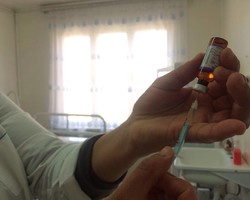Kyrgyzstan strengthens capacities to prepare for and respond to measles outbreaks

UNICEF
A simulation exercise and workshop were conducted in Kyrgyzstan as part of ongoing capacity-building activities to respond to the current measles outbreak and prepare parts of the country not yet affected by the outbreak.
Simulation exercise
On 13 May 2019, the Ministry of Health organized and led a 1-day field simulation exercise in Tokmok city. Over 80 participants took part in the exercise, including representatives of the Ministry of Health, the Republican Centre for Immunoprophylaxis, the State Sanitary Epidemiological Surveillance Service, local governance, communities, schools, the media, the United Nations Children’s Fund (UNICEF) and WHO.
The exercise was held at a primary health care clinic and hospital in Tokmok city and simulated the arrival of a mother with an infant with suspected measles. It reviewed the referral of the suspect case from the family doctor to paediatrician, followed by admission to the infectious disease hospital, including contact management in the community and in a school. The exercise provided the opportunity for critical review of existing plans and procedures for responding to measles.
Simulation exercises and the review of ongoing and past responses (after action review) are critical elements of an effective emergency preparedness programme. Furthermore, they are important parts of the WHO International Health Regulations (2005) monitoring and evaluation framework, alongside the external evaluation (voluntary) and the state party annual reporting (mandatory).
Exercise feedback and lesson capture
In the same week, the Ministry of Health and WHO conducted a 3-day workshop to review operations for the ongoing measles outbreak. The 30 participants from the national and regional level were divided into 5 working groups covering distinct response functions: surveillance; case management and infection prevention and control; risk communication, including community engagement; information management; and national coordination.
Through a combination of the working group and plenary sessions, the participants reviewed what was working, what could be working better and identified lessons learned, best practices and activities needed to improve the ongoing response to the measles situation and to ensure the conditions for success are reproduced in future response efforts.
Participants considered the workshop a very useful tool to better understand the challenges and best practices of the current outbreak response and what is needed to be better prepared in the future. The outcomes will be summarized in the final report and presented to the Ministry of Health.



